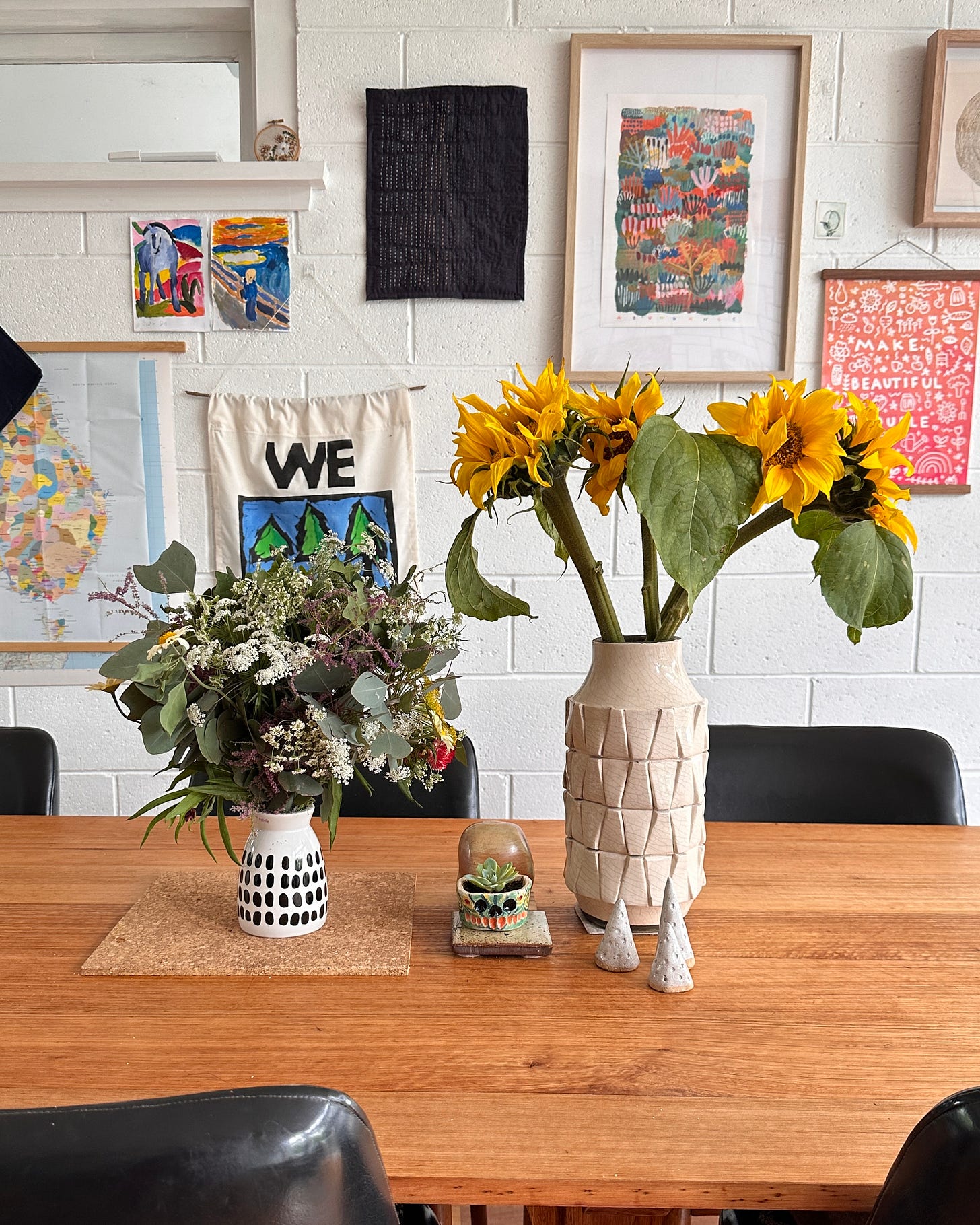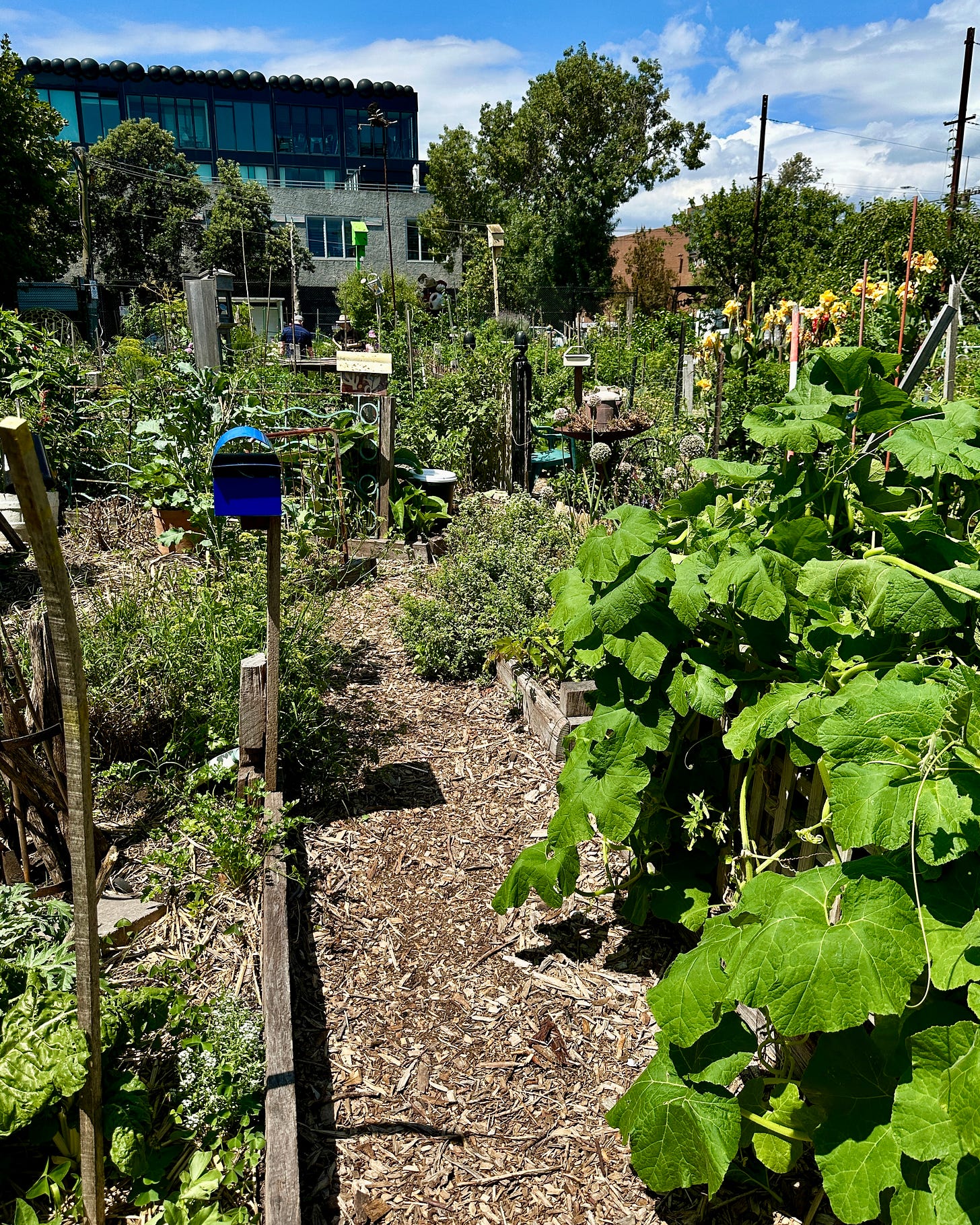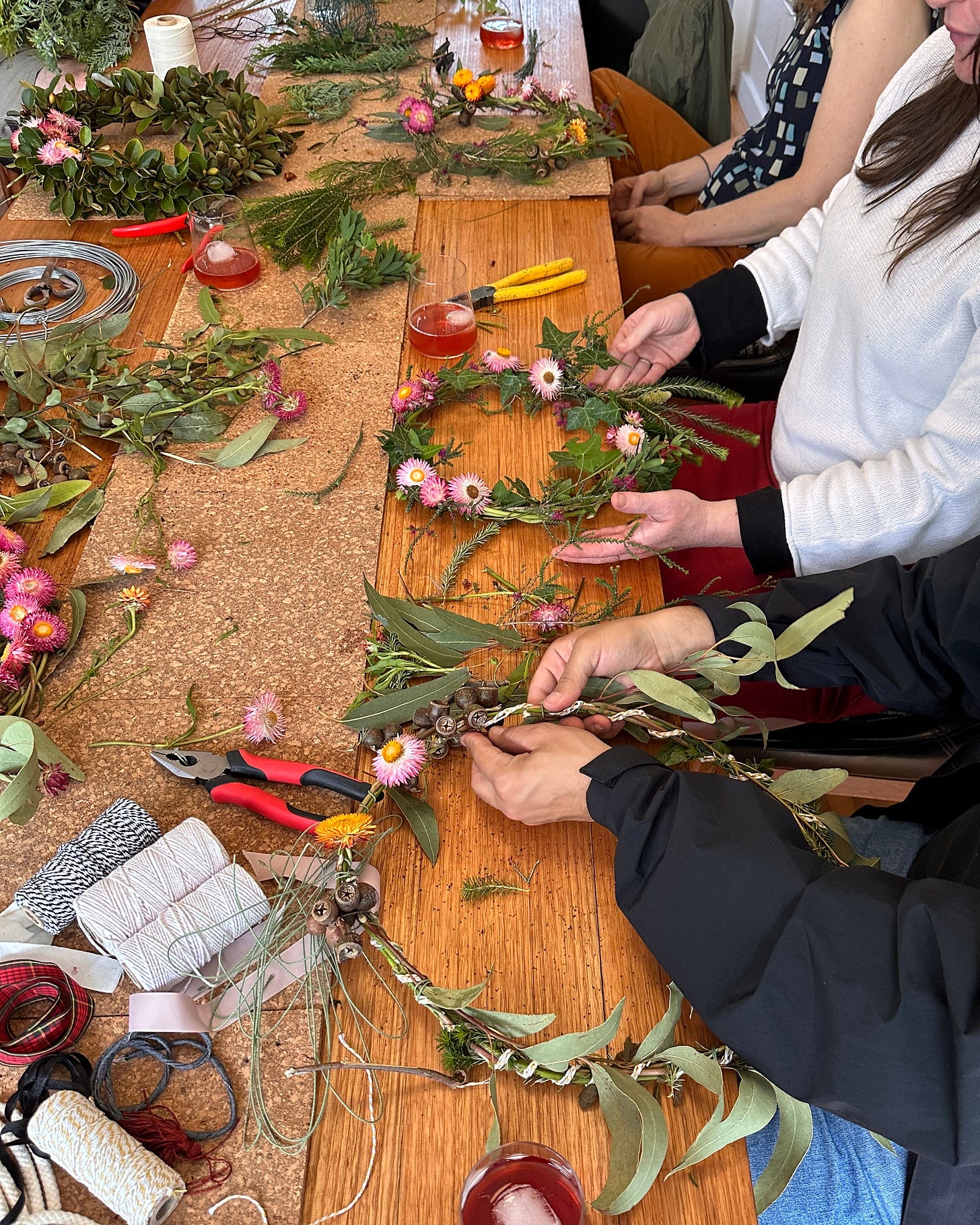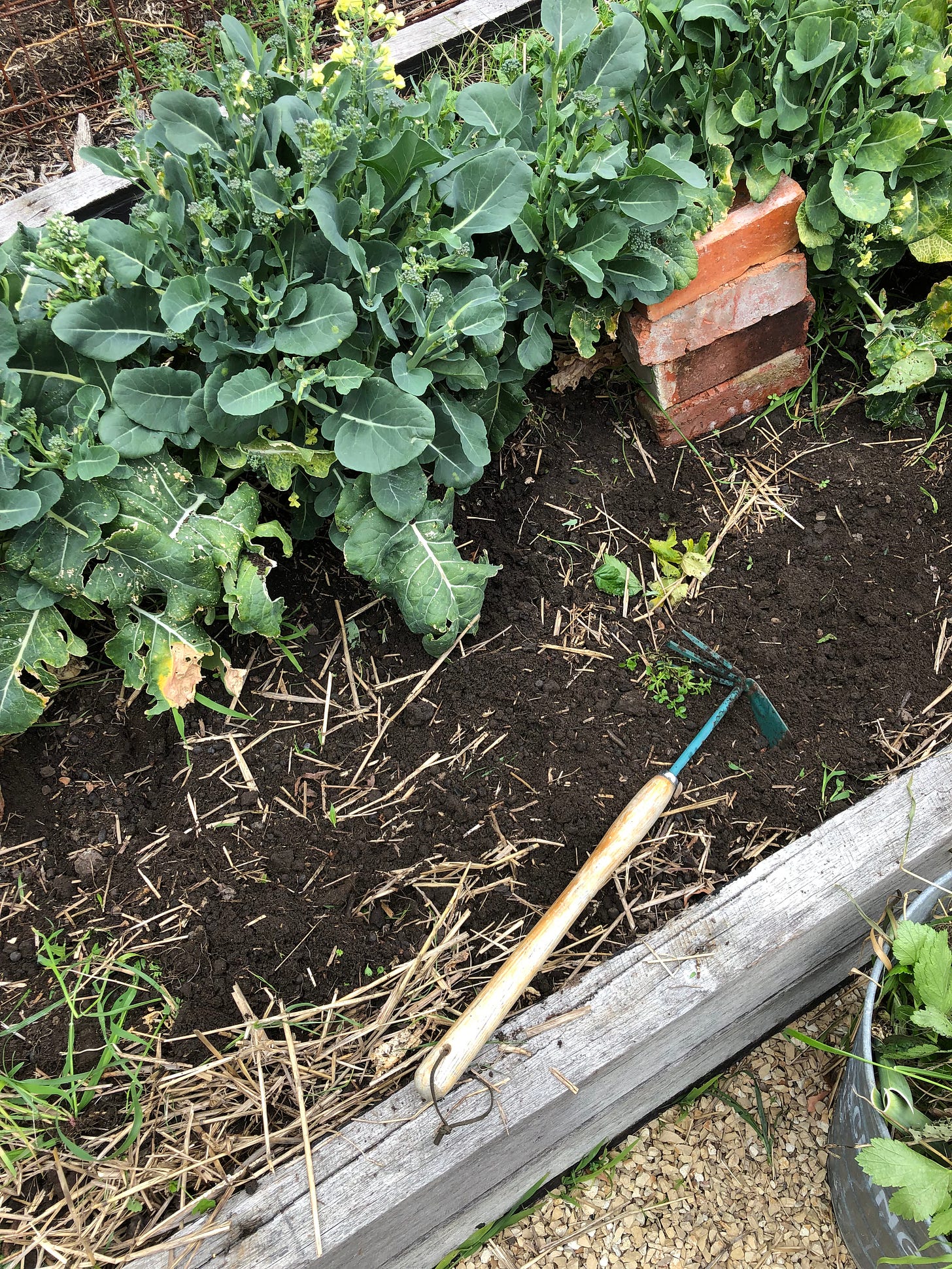Build your bucket-line community (Alt: Mutual aid for life)
Part 3: Ten things to take into 2025
Welcome to this 10-part series on 10 things to take into 2025.
This series is a homage to Catie Payne’s awesome Reskillience podcast's '10 Things’ series, in which her guests gather a list of 10 things to inspire a more resilient, skillful future.
Over 10 weeks, I’m jotting down 10 things (habits, ideas, mindset shifts, and gentle reminders) I’m taking into 2025, which is allowing me to sprinkle in all the juicy changes happening for me this year too.
Here are the previous parts:
Part 1: Digital tools over digital drugs (Alt: Go at human pace)
Part 2: Go deeper
What are you taking into 2025? Let me know in the comments, I’d love to know.

Thing #3: Build your bucket-line community
(Alternatively: Mutual aid for life)
If I think about levels of community like fractals, say in the example of a tree (stay with me here), the leaves are partnerships and family units.
Some of the thicker branches are communities that require some leadership and structure. For me, that’s the Repair Cafe, Skillshare groups, and the community garden. Other communities might be clubs, associations, or churches—all really valuable ways to connect with people on a bigger scale.
Are you still with me?
Then there are whopper global communities (maybe the trunk of our tree?) like social media and online interest-based communities. These are great avenues to connect with people who share your values and can provide platforms for skills and knowledge sharing. Super valid stuff.
But I reckon there’s a level missing (for me anyway). A really important one.
There’s a big gap between the leaves (partnerships and family units) and the thicker branches (club-level communities). Something nourishing could happen at the twig level.
In this gap, there could be a community where we connect face-to-face in a genuinely supportive, joyful, easy, and leaderless way.
Maybe there’s space and a need for a deep connection with a small group of people who gift each other their time and resources in peaceful times and build resilience in preparedness for hard times.
Is this where super-effective mutual aid, deeply satisfying connection, and joy could reside?

I’ve had innumerable conversations over the years about the poly-crisis. Often, the convos end with a collective agreement that community connection is THE ANSWER. But then, no one seems to have any fab ideas on how to make that happen in a truly meaningful way.
Are we too busy? Too untrusting? Or are we too embedded in the dominant culture that has us building high fences, buying EVERY. SINGLE. THING. we could possibly need, and hiring people to help us—instead of asking our community for help?
How do we burst this kinda comfortable, but also kinda isolating bubble?
Who will be on the bucket-line with us, when things get tough?

There are some super successful examples of how to build a high-functioning community, like Shani Graham’s Ecoburbia (her must-watch Tedx talk is here). It’s truly inspirational. Shani has big ‘school principal’ energy that aided her in bringing her community together. That kind of energy is something many of us lack, and thus our dreams of a tight-knit neighbourhood community can feel dashed from the start.
In Okinawa, Japan there’s a tradition called Moai where a small group of women are grouped together as babies and live their whole lives gathering regularly in support of one another. From Wikipeadia:
Moais (模合, Mo-ai) are social support groups that form in order to provide varying support from social, financial, health, or spiritual interests. Moai means "meeting for a common purpose" in Japanese.
Some people find themselves in organically occurring location-based communities, like in small country towns. But it seems to be more challenging to make this happen in the burbs.
But fear not, a handful of Permie-buddies and I are trying to crack the case. We’ve been listening to the needs and desires of the people around us and tapping into our own as well. We are having a go at building a framework that could potentially fill this community connection need.
I have a lot to tell you about this idea. I could probably fill a whole newsletter series—maybe I will.
Currently, I’m prototyping the framework with a small group of geographically close friends who all have big gardening and permaculture aspirations, even though we are a bit time-poor and feel a bit isolated in our endeavors.
Our general aim is to get together for mini working bees. The key is little and often. We also aim to:
Share abundance, skills, information, and friendship
Cultivate community sufficiency (rather than self-sufficiency)
Reduce individual overwhelm
Foster deep connection
Forefront inclusivity and diversity
Share intergenerational wisdom
Co-regulate with other humans in tough times
We’ve just started meeting to see where this could take us. I’ll definitely report back with our findings. Hopefully, I’ll have a tested framework to share with you too.

One lofty goal I have for this group is to build long-term mutual aid and community connection in the easy times, so we become well-practiced, well-resourced, and well-connected in case of tough times.
Maybe this is how to build a bucket-line community in the suburbs.
I recently listened to this Upstream podcast. It was about the LA fires and a well-practiced community group who were able to leap into active support. They said:
What’s the best form of disaster preparedness? Having a community.
They spoke about how community is best built in peacetime when we can create connections, trust, and muscle memory for working together.
I was punching the air.
This is so important.
We’ll work away at it, and get back to you.
Thank you for reading this installment of Ten things to take into 2025.
Is community connection in your thoughts this year too?? I’d love to hear from you.
Keep an eye out for the rest of this series coming to your inbox weekly.








I love this! Every year I feel like fostering community connection is the goal, but it is SO hard. Everyone wants a village, however, not many are prepared to put in the effort to maintain said village. We’ve tried monthly potluck bbqs, meeting most weekends at the local farmers market, beer brewing days etc etc and it all feels very one-sided most of the time. I love the concept of little and often for your skill sharing group
I feel very lucky that I live in one of those rural small communities where we are forced to build relationships with all different people, held together often by location, often with varied values, but still come together to support each other, as we did in the 2013 fires. After living in Darwin with a great community, when we moved to Sydney in the suburbs, I felt untethered, with no community. Moving home to Tassie and further out from the city certainly fixed that! I have always wondered how people in the cities manage to find communities.
I love what you're doing, but I wonder - when and how does someone in the community ask for help? Especially how.... Who will be the first, and how will they get over that? Do you have a plan or a shared mental model in the group to assist with this? I'm really interested in this, because I recognise in myself, that sometimes I don't even realise I need help, or how to ask for it. Crises are easy, but sometimes, the big crisis isn't the undoing of us, it's the repeated small things we don't even clock as mini-crises...